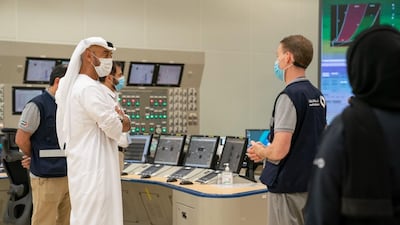Sheikh Mohamed bin Zayed hailed the "remarkable progress" being made at the UAE's first nuclear power plant during a tour of the facility on Thursday.
The Crown Prince of Abu Dhabi and Deputy Supreme Commander of the Armed Forces praised the commitment of the team at the Barakah Nuclear Energy Plant who he said typified the country's "pioneering spirit".
When completed, the plant will have four reactors with total capacity of 5,600 megawatts and will be able to provide up to 25 per cent of the UAE's energy needs.
Sheikh Mohamed reflected on a successful partnership with South Korea to help bring the mega project to fruition.
"Today we witnessed remarkable progress at the Barakah Nuclear Energy Plant," said Sheikh Mohamed on Twitter.
"We are grateful for the, resilience and commitment of the Barakah team who truly represent this country’s pioneering spirit. This project is a source of pride for everyone who calls the UAE home.
"South Korea is a strategic partner of the UAE in many fields, particularly in peaceful nuclear energy. We are thankful and proud of this long-standing relationship that has enabled the exchange of specialized expertise, and contributed to the UAE’s long-term prosperity."
The royal visit comes in a year of encouraging developments for the Arab world's first nuclear power plant.
In February, the UAE's nuclear regulator issued an operating licence for the first reactor at Barakah in a significant step before firing up the atomic power plant.
The licence granted to Nawah Energy Company, the plant's operator, will be for 60 years, Hamad Al Kaabi, deputy chairman of the Federal Authority for Nuclear Regulation, said.
Delivering the project has been a feat of engineering. As many as 18,000 people worked on the project at the height of construction.
Huge amounts of materials were taken to the remote site, about 280 kilometres west of Abu Dhabi.
Once all four reactors are operational, Barakah will have a daily workforce of about 2,500 people, Mr Al Kaabi said, and maintenance workers drafted in every two months.
That includes hundreds of technicians and engineers from the UAE, South Korea and the US.
Fifty-three Emiratis have recently been certified as senior reactor operators and many more will be needed in coming years.
Engineers marked another milestone in March when the first of four reactors was loaded with nuclear fuel, which was regarded as the official start of operations. The reactors will eventually provide up to 25 per cent of the UAE’s energy.
The plant was more than a decade in the making, with the UAE revealing its ambitions to pursue a civilian nuclear energy programme in 2008.
Barakah is not yet feeding power into the electricity grid but that landmark is expected to be completed within the coming months after the first reactor is switched on and gradually powers up.
The operation was completed by a team made up almost entirely of Emirati experts, who trained in South Korea, which has been working with the UAE to build the plant.












